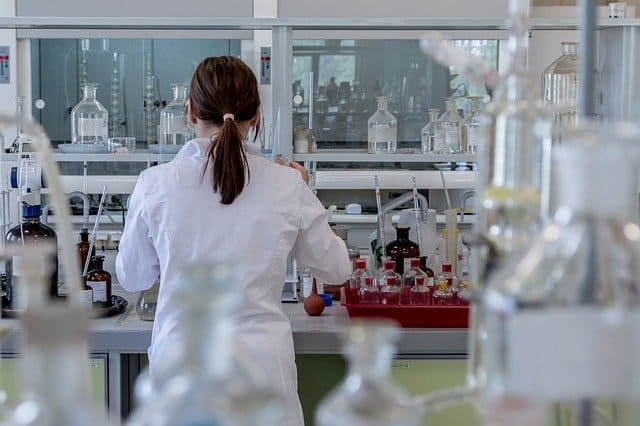The endocrine system coordinates the functioning of the various organs by means of hormones, chemical compounds directly released into the bloodstream from different specific cell types of the endocrine glands (without excretory channels). Once in circulation, hormones change the function of target tissues, which can be another endocrine gland or an organ. Some hormones exert an effect on the cells of the organ from which they are released (paracrine effect), some even on the cell type that produced them (autocrine effect).
Composition of the endocrine system
The human body contains nine major endocrine glands, which are:
1. The hypothalamus gland
This gland is the only link between the human nervous system and the endocrine system. It is located in the middle part below the brain. The role of the hypothalamus gland is the collection of information from the brain and sends it in form of hormones for the pituitary gland.
2. The pituitary gland
This gland is often referred to as the "main gland" of the endocrine system. It greatly affects other organs in the body, and the pituitary gland produces several hormones, including prolactin, GH, follicle-stimulating hormone (FSH), and lutein and oxytocin (Oxytocin).
3. The thyroid gland
This gland is similar to a butterfly, in shape, and is located in the front area of the lower neck, and it plays its role in the metabolism process, from burning food and converting it into energy.The thyroid gland also plays an important role in striking a balance in the body; through the development of the brain and nerves, as well as the health growth and development of bones and the balance of the rates of food burning and the storage of fats. Through the hormones they produce, such as thyroid hormone (T4), and the hormone calcitonin, and the hormone Triiodothyronine (T3).
4. The parathyroid glands
It is called this name because of its presence beside the thyroid gland, and it is made up of 4 small glands, which secrete the thyroid hormone before it regulates along with calcitonin hormone, the levels of calcium, phosphates, and vitamin D in the blood.
5. The adrenal gland
A pair of adrenal glands appear at the top of the kidney, one to the right, resembling a triangle, and the left gland is almost like a moon. The adrenal gland helps control blood sugar; in addition, it helps your body do a number of tasks, namely:
- Promote cardiovascular function
- Use carbohydrates and fats correctly
- Helps distribute stored fat
- It enhances the functions of the digestive system
6. The pancreas gland
Another gland of the endocrine system is the pancreas gland. The main function of the pancreas is to maintain healthy blood sugar levels; it is a large gland located behind the stomach. Diabetes occurs when the pancreas does not produce enough insulin or when the body does not use insulin properly and is called insulin resistance.
7. The pineal gland
It is a small gland of the endocrine system, located below the brain behind the pituitary gland and secretes the melatonin hormone. The size of the pineal gland decreases with the passage of years and reaches 10% of its original size at the age of seventy.The pineal gland is functionally related to the sympathetic nervous system. It performs several functions, including the regulation of the sleep cycle of a person through the secretion of the melatonin hormone.
8. The thymus gland
This gland plays the most important role within the human immune system, which is to facilitate the work of the adaptive system by developing and training T lymphocytes.
9. The gonads gland
These glands are responsible for the secretion of sexual hormones, which differ from the male to the female. The male contains the gonads known as the "testes," while these glands in females are called "ovaries."The testes are located inside the scrotum, and its function is to secrete androgen hormones during puberty in males. While the ovaries are located inside the pelvis, and are responsible for the production of eggs and the emergence of signs of puberty in females, through the secretion of the progesterone hormone and the female hormone estrogen.
Factors affecting endocrine system functions
It is known that the glands depend on the performance of their function on the secretion and production of hormones in the blood through the blood circulation until it reaches the various parts and cells of the body to do its job.Although the task of the glands is direct and does not need a mediator, these glands may face some problems to perform their optimal role within the human body, such as:
- Age
In general, some changes occur in the glands, with age, the most notable the difference in the number of hormones secreted, as well as their dissolution. In contrast, the response of target tissues to hormones varies, with age as well.
- Diseases
Diseases are the most prominent factors affecting endocrine function, especially chronic diseases, which cause a notable rise in the level of some hormones or, in other cases, a noticeable decrease.
Endocrine system diseases
Any disease that causes an increase or decrease in the level of hormones in the blood affects widely all the functions of the body, and among the chronic diseases that affect the endocrine function:
- Cushing's syndrome
This syndrome is caused by an increase in the secretion of the cortisol hormone into the blood produced by the adrenal gland, which results in the appearance of some symptoms that are closely related to the height of this hormone.Among the most important and prominent symptoms:
- Overweight.
- Acne.
- The appearance of protrusion on the back and shoulder.
- Stretch of the skin on the abdomen.
- Reduced sexual arousal and male fertility.
- Disturbances in menstruation dates for females.
- Diabetes
It is one of the chronic diseases that causes a high level of blood glucose sugar, as a result of the presence of insulin hormone deficiency produced by the pancreas (which is one of the endocrine types).The symptoms of this disease, in both types (1 and 2), are as follows:
- Extreme thirst.
- Excessive urination.
- Extreme hunger.
- Weight loss.
- Difficulty healing wounds.
- Feeling tired in general
Treatment of endocrine problems
The treatment of endocrine glands depends on maintaining the balance of hormones secreted by these glands, to avoid exposure to previous diseases.After taking hormone control drugs under the supervision of a doctor, you can do the following:
- Ensure that you eat protein, fiber, and healthy fats.
- Exercising regularly.
- Reducing the intake of refined sugars and carbohydrates
- Adequate rest, and not to be stressed.
- Maintaining a nutritional balance between excess and scarcity.
- Be sure to drink green tea as the healthiest drink in the world.
- Eat omega-3 fatty acids frequently.
- Give all body parts adequate sleep.
Foods that are good for the endocrine system
- Dairy.
- Marine plants.
- Blueberries.
- Salmon.
- Pasta.
Foods that harm the endocrine system
- Gaseous drinks
- Coffee and caffeine products.
- Cereal and cabbage pulses.
- Sugary foods
- Cooked chicken breasts; methods and techniques
- What are the 10 keys to happiness?
- How many carbs in white and brown rice?
Originally published on Live Positively.






